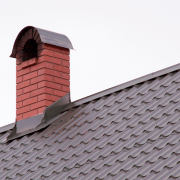Chimneys—Is a Repair Needed?
By Megan S. Ward
A chimney is a very special part of the house. It can provide insulation from the various seasons, airflow into the house, a family gathering point and so much more. Do you use your chimney often? Over time, just like household most appliances and outside structures, weather has an influence on the composition of your chimney. In this article, I will go over how to tell if your chimney needs to be repaired, what causes the dilapidation of your chimney over time and how a worn-down chimney may lead to your financial demise.
Using your chimney frequently is a health factor for its lifespan. Think of it in this way: your chimney carries out the same function as a car’s exhaust system. This means that your chimney is used to safely remove any harmful products of combustion, whether they are hydrocarbon compounds, carbon dioxide, water vapor, carbon monoxide or wood particles that haven’t been burnt yet. Your home is now a risk for your family. All of these substances emitted by the fire place pose a threat to your household by the increased chance of fire and carbon monoxide poisoning. You may have already suspected that you need to repair your chimney, but upon closer inspection, it may be just a single part that is in need of tender loving care.
- Water: Water is an essential part of all life forms. It flows and ebbs as destiny directs it. However, in terms of chimneys, it is a formidable adversary. Most chimneys are extremely susceptible to any form of water damage. This is due to the fact that most chimneys in America are made with brick. Brick is a porous type of material that is held together by water-soluble mortar, which has the capability of breaking down in any amount of water. If a material is porous, it is very absorbent. Used together, they are a weak defense against the liquid elements. To make matters worse, usually the inside of your chimney is made of metal, an easy target for rust. You can easily tell if water is getting in by water damage to the nearby ceilings and walls, rainwater in your fireplace, dripping noises, a weakened masonry and deteriorated mortar joints as well. Leaky chimneys are not uncommon in having water leak in, but it is imperative to locate where the water is coming in, even if it may be from multiple points. Remember, this will cost more money in the long-run if not fixed now, as it could damage the rest of the area next to the chimney. You may consider it to be your roof that is leaking, when it may very well be the chimney itself. This can be fixed with a water-proofing sealant.
- Chimney Cracks: Little pig, little pig, let me in! The timeless tale of brick’s strength in the Three Little Pigs never gets old. How strong are your bricks? Chimneys are relied on by a many to safely channel smoke, from fire, outside. This prevents a repository of creosote from building up if the chimney is maintained well, without any leaks or cracks. In fact most chimneys can last up to 25 years or more. But if you own an old house, chances are that you have a chimney that is more than 15 years old. The importance of age is due to the fact that the mortar joints, the pieces between the bricks or material, begin to flake off, crack and wash away. Even if your chimney is not that old, it may also be your environment. If you live in an area where there is winter and warm seasons, your chimney is more susceptible to the freeze and thaw action due to the colder climate. With this in mind, think of how easily moisture can makes its way into the cracks and crevices of the masonry. This can cause a lot of damage to more than just your metal lining on the inside; it can cause damage to your satellite dish, as well as your lighting rod.
- Type of Home: Depending on what type of home you own, the strength of your chimney may be questionable. If you have a historic home, your house may seem fortified, but historic homes’ chimneys were used with coal for heating. Since the coal would be burnt with a high amount of heat, the chimney is too cold for just wood as the powered boilers tend to be a bit oversized. This makes the risk of condensation higher, thus resulting in more damage. A lack of care and inspection can call for the means of major and extensive repairs in the future. Getting proper knowledge on the type of home that you have may allow you to save yourself a lot of money and stress in times to come.
- Your Home’s Location: The location of your home, and I mean more than just warm/cold weather, plays a major role in your chimney’s health as well. For instance, if you lived near or in Seattle, the Earthquake that occurred in 2001 may have left your home with chimney damage. This is due to the overall layout of the chimney itself. Since chimneys are so rigid, they don’t move with any Earthquake ad tend to cause cracks and dismantled chimneys. Wood-framed houses can easily move with an Earthquake, but if a chimney has not been inspected after the onslaught of a natural disaster, then it’s probably damaged. Getting an inspection as well as performing maintenance is vital in extending the lifespan of your home. Without a proper inspection, your damaged chimney, if ever used, can lead to gas leakage from carbon dioxide and other toxic gases.
You can identify some of these things on your own, as far as leaks, home history and locations go. For more serious things like cracks, it is wise to get a professional inspector to take a look at your chimney as there may be multiple points at which the water is leaking in from. The lining of your chimney aids in its overall health and prevents future repairs as it ensures the proper function of your chimney—to lessen the chance of gas leaking into the house. I would say to remember the 3R rules of chimney repair. The three rules are reinforce, repair and reproof. If you can replace any missing parts, repair the outside if it is cracked or worn and waterproof the chimney every couple of years, you’ll save much more than you would with a professional for maintenance tasks. However, a lot of these problems may be time consuming and if handled incorrectly—fatal. Unless you really know what you are doing and are sure that there are no problems, then by all means, continue to do so.






